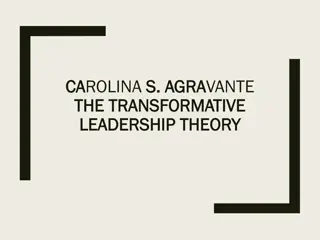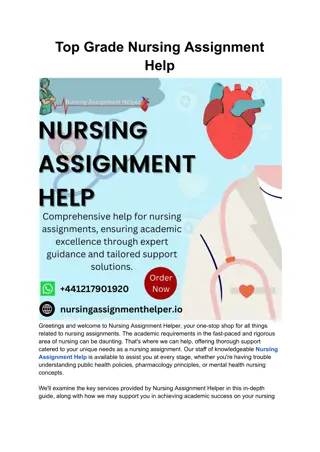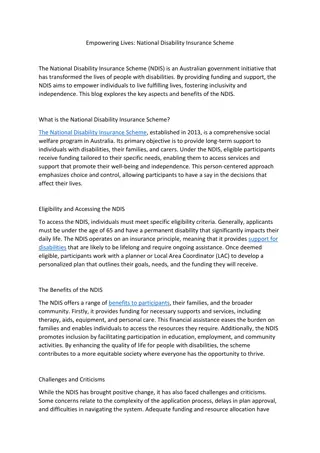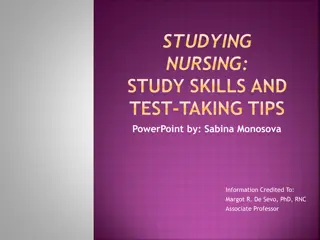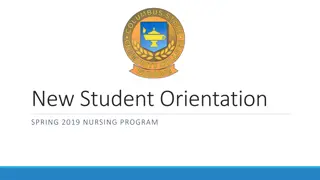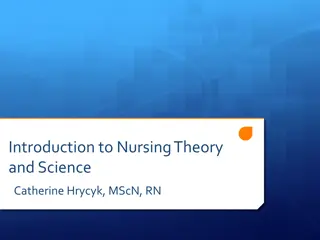
Understanding Nursing Theories: A Comprehensive Overview
Explore the world of nursing theories with this detailed presentation covering metaparadigm, global terms, and key concepts like phenomenon, model, and more. Learn about the major metaparadigm in nursing - Person, Nursing, Health, Environment. Dive into the domain of nursing philosophy, constructs, and propositions. Gain insights into the discipline's research and scientific aspects. Delve into the broad view of nursing issues represented by global terms.
Download Presentation

Please find below an Image/Link to download the presentation.
The content on the website is provided AS IS for your information and personal use only. It may not be sold, licensed, or shared on other websites without obtaining consent from the author. If you encounter any issues during the download, it is possible that the publisher has removed the file from their server.
You are allowed to download the files provided on this website for personal or commercial use, subject to the condition that they are used lawfully. All files are the property of their respective owners.
The content on the website is provided AS IS for your information and personal use only. It may not be sold, licensed, or shared on other websites without obtaining consent from the author.
E N D
Presentation Transcript
Nursing Theories SHAHNAZ POULADI ASSISTANT PROFESSOR
Objectives *Metaparadigm *Domain *Philosophy Working terms *Phenomenon *Concept *Construct *Proposition Middle terms *Model *Theory *Paradigm *Discipline *Research *Science Global terms
Global Terms Global terms are those expressions which represent a very broad view of issues that are relevant to nursing
Global Terms Metaparadigm The major concepts in a discipline that names the phenomena of concern
Global Terms The major metaparadigm in nursing Person Nursing Health Environment
Global Terms (Metaparadigm) Person Definition Biological human beings with inseparable mind and body fundamental human needs (Henderson, 1966) An un fragmented whole who carries out or is assisted in carrying out those activities that contribute to the process of living (Roper, Logan, and Tierney, 1990) who share certain
Global Terms (Metaparadigm) Person Definition A functional integrated whole with a motivation to achieve self care (Orem, 1980) A bio-psycho-social presents as an integrated whole (Roy, 1971) being who
Global Terms (Metaparadigm) Nursing Definition A profession whose focus is to help the client to prevent, solve, alleviate or cope with problems associated with the activities he or she carries out in order to live (Roper, Logan and Tierney, 1990) A profession that assists the person sick or well in the performance contributing to health or its recovery that he or she would perform unaided, given the necessary strength, will or knowledge (Henderson,1966) of those activities
Global Terms (Metaparadigm) Nursing Definition A human service related to the clients need and ability to undertake self-care and to help them sustain health, recover from disease and injury or cope with their effects (Orem, 1980) A socially valued service whose goal to promote a positive adaptation to the stimuli and stresses encountered by the client (Roy, 1971)
Global Terms (Metaparadigm) Health Definition The ability regarding fourteen activities of daily living (Henderson, 1966) The optimum of independence in each activity of living which enables the individual to function at his/her maximum potential (Roper, Logan and Tierney, 1990) to function independently
Global Terms (Metaparadigm) Health Definition A state of wholeness or integrity of the individual, his parts and his modes of functioning (Orem,1980) The adaptation of the person to stimuli on a continuous line between wellness and illness (Roy, 1971)
Global Terms (Metaparadigm) Environment Definition That which may act in a positive or negative way upon the client (Henderson, 1966) Circumstances that may impinge upon the individual as he or she travels along the life- span and cause movement towards maximum dependence or maximum (Roper, Logan and Tierney, 1990) independence
Global Terms (Metaparadigm) Environment Definition A sub-component of man, and with man forms an integrated system related to self-care (Orem, 1980). Both internal and environmental people are subject to stresses (Roy, 1971). external. From the
Global Terms (Domain) Domain Definition Domain is the perspective and territory of a discipline (Meleis, 1991) She identifies seven concepts as central to the domain of nursing. These are : nursing client, transitions, interaction, nursing process, environment, nursing therapeutics and health.
Global Terms (Philosophy) Philosophy Definition Philosophy is values about the world, a perspective on human being and their world , and an approach to the development of knowledge (Fawcett, 1992). a statement of beliefs and
Nursing Philosophy Early works introduce the nursing theory era have contributed development by providing forming a basis for subsequent developments Later works reflect more recent expansion in the areas of human science and its methods (Alligood, 2002; Meleis, 2004) to knowledge direction or
Working Terms Phenomenon Concept Construct Proposition
Working Terms (Phenomenon) A phenomenon is a thing, event or activity that we perceive our senses . (sixth sense). The aspect of reality perceived. (e.g., Prior to surgery) through that can be
Working Terms (Concept) Concept is a label used to describe a phenomenon or a group of phenomena (Meleis, 1991). (e.g., Anxiety) Concepts are the building blocks of theory Concepts are special vocabulary in a theory (Fawcett & Downs, 1992).
Working Terms (Construct) If the phenomena are very abstract and the resultant concept is not directly observable or measurable it is often Construct (e.g., self-esteem). referred to as If we imagine a continuum (thermometer) to abstract (caring), constructs would be placed at the abstract end. We must remember that all constructs are concepts, but not all concepts are constructs. of concepts from concrete Constructs may be made measurable by identifying Variables . (e.g., Civil status, is perceived as a construct, it could be made measurable by breaking it into variables single and widowed , divorced , married .
Working Terms (Proposition) Different and statements of relationships. Such linking statements Propositions ). (Meleis, 1991) concepts, constructs, variables can be linked by are called
Middle Terms Model Theory Discipline Research Science
Middle Terms (Model) Representation of reality. (Mcfarlane, 1986) A simplified way of organizing a complex phenomenon .(Stockwell, 1985) A model is a set of concepts and the assumptions that integrate them in to a meaningful configuration. 1992) (Fawcett,
Middle Terms (Model) Type of models One dimensional model Two dimensional model Three dimensional model
Middle Terms (Theory) The natural science of physics, astronomy, chemistry, biology, etc. have laws to explain how particular phenomenon behave . enable scientist to predict with an absolute degree of certainty the results of a specific experiment. In nursing, because we are dealing with human being and their complex realities, it is almost impossible to formulate laws. The best that can be done is to generate different types of theory to help us describe, explain, predict or control human behaviors. Such laws
Middle Terms (Theory) Theory is a set of concepts, definitions and propositions systematic view of phenomena designing specific among concepts for the purpose describing, explaining, predicting, and controlling phenomena. ( Chinn and Jacobs, 1897) that project a by interrelationships of
Middle Terms Type of theories Grand theory is highly abstract and is broad in scope Middle range theory is more focused and is normally the end product of a research study Narrow range theory is even more specific while also being based upon research findings, it guides specific actions in the achievement of desirable goals.
The model-theory debate Conceptual model conceptual model Research Research Theory Theory Theory Theory Science/Knowledge
Theory-model debate Grand theories Research Mid-range theories Science/ Knowledge Research Practice theories
Middle Terms (Paradigm) The word Paradigm derives from the Greek word paradeigma, pattern. Paradigm represents global ideas about the individuals, groups, situations and events of interest to a discipline . (Fawcett, 1992) meaning
Middle Terms Type of Paradigms There are four main paradigms which may be used for the classification of nursing theories. System paradigm Interactional paradigm Developmental paradigm Behavioral paradigm
Type of Paradigms (System paradigm) Theories within this paradigm are largely based upon the paradigm as put Bertalanffy (1951). Within this paradigm every event and occurrence can be perceived as a system general forward system by Von .
Type of Paradigms (Interactional paradigm) Interactional paradigm have their origin in the symbolic interactionist 1969). This paradigm emphasizes the relationships between people and the roles they play in society. Nursing activities are perceived as interactional processes between practitioners and clients. paradigm (Blumer,
Type of Paradigms (Developmental paradigm) The developmental paradigm originated from the work of Freud (1949) and Sullivan (1953). The central themes are growth, development, maturation, and change. Within this paradigm , human beings are constantly developing physiologically, socially, psychologically or spiritually. whether this be cognitively,
Type of Paradigms (Behavioral paradigm) The behavioral paradigm owes much to the theoretical formulations of Abraham Maslow (1954) concerning motivation. The behavioral paradigm individuals normally exist and survive by meeting their own needs. assumes that




